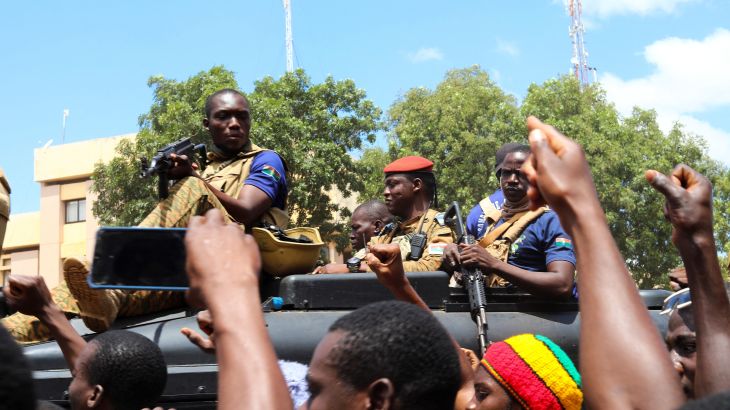Burkina Faso confirms it has ended French military accord
Burkina Faso’s government spokesman says the country wants to defend itself and France has one month to pull out troops.

Burkina Faso has decided to end a military accord that allowed French troops to fight armed groups in the country, the government has said.
Burkinabe authorities want France to pull its troops out of the country within a month, government spokesman Rimtalba Jean Emmanuel Ouedraogo said on Monday.
Keep reading
list of 3 itemsBurkina Faso requests French ambassador withdrawal, Paris says
Al-Qaeda affiliate claims deadly Mali attack
Armed groups linked to al-Qaeda and ISIL have taken over large swathes of land in Burkina Faso and displaced millions of people in the wider Sahel region, just south of the Sahara.
The West African country’s national television station reported on Saturday that the government had suspended the 2018 military accord with France, though it still wanted support in the form of equipment.
French President Emmanuel Macron on Sunday said he was awaiting clarifications from Burkina Faso’s transitional President Ibrahim Traore about the decision.
France deploys about 400 special forces soldiers in Burkina Faso, which is ruled by a military government, but relations have deteriorated and tensions have soared in recent months.
“We are terminating the agreement which allows French forces to be in Burkina Faso,” Ouedraogo told Radio-Television du Burkina.
“This is not the end of diplomatic relations between Burkina Faso and France,” he said. “This termination is normal and is foreseen in the terms of the agreement.”
The ruling military and the whole country wanted “to be the prime actors in the recapture of our territory”, he said, echoing coup leader Traore’s rallying call to make reclaiming swaths of land from armed groups a top priority.
Russia ‘a reasonable choice’
There was no immediate comment from French authorities on Monday.
French troops pulled out of neighbouring Mali last year, ending a decade-long fight against armed groups, after relations deteriorated between the two countries.
Both Burkina Faso and Mali are ruled by military governments that seized power by force in the last two years, promising to improve security and burning bridges with their traditional allies.
Since the army seized power in Burkina Faso last September, several demonstrations have taken place calling for the departure of the French ambassador, as well as the French troops.
Protesters attacked the French cultural centre in the capital Ouagadougou in October.
Burkina Faso, like its neighbour Mali, appears to be turning increasingly towards Russia as a partner.
“Russia is a reasonable choice in this dynamic,” Burkinabe Prime Minister Apollinaire Kyelem de Tambela said last week after talks with the Russian ambassador and a December visit to Moscow.
“We think our partnership has to be strengthened,” he added.
Macron has accused Russia of a “predatory” influence in some African countries as France has seen its own influence diminish.
The French army’s departure from Mali coincided with the military government’s decision to hire Russian mercenaries to help it fight armed group fighters, a move Western countries strongly condemned.
Burkina Faso has neither confirmed nor denied recent reports that it has also decided to hire Russia’s Wagner Group.
If French forces were to pull out of Burkina Faso, Paris could seek to redeploy to the south of neighbouring Niger, where nearly 2,000 of its soldiers are already stationed.
Niger is struggling with two uprisings and seeking to boost the numbers of its armed forces.
France and the United States both have important military bases in the vast country, while Germany has a logistics base there.